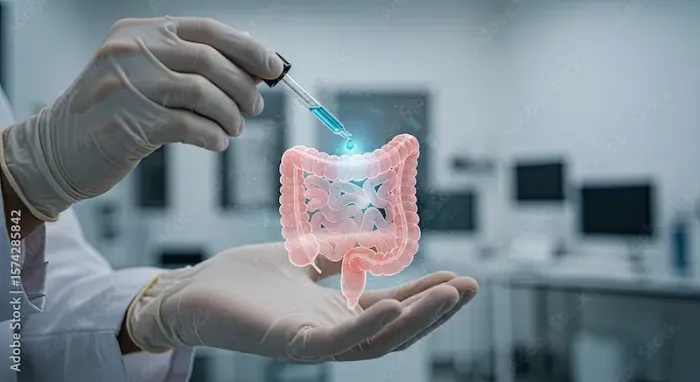Understanding Irritable Bowel Syndrome and Diagnosis
Learn about irritable bowel syndrome (IBS), its symptoms, potential triggers, and diagnosis methods. Understand how timely identification can help manage this common digestive disorder effectively.

Written by Dr. Mohammed Kamran
Reviewed by Dr. Dhankecha Mayank Dineshbhai MBBS
Last updated on 28th Aug, 2025

Irritable Bowel Syndrome (IBS) is a common digestive disorder that affects millions of people worldwide. If you frequently experience stomach pain, bloating, or changes in bowel habits, you might be dealing with IBS. While it can be uncomfortable and frustrating, the good news is that IBS is manageable with the right approach.
In this article, we’ll break down what IBS is, its symptoms, possible causes, and how doctors diagnose it. We’ll also share some practical tips to help you manage the condition and improve your quality of life.
What Is Irritable Bowel Syndrome (IBS)?
IBS is a chronic condition that affects the large intestine (colon). Unlike more serious digestive diseases like Crohn’s or ulcerative colitis, IBS does not cause permanent damage to the intestines. However, it can significantly impact daily life due to recurring discomfort.
Consult a Top Gastroenterologist
Common Symptoms of IBS
People with IBS may experience a mix of the following symptoms:
• Abdominal pain or cramping – Often relieved after a bowel movement.
• Bloating and gas – Feeling uncomfortably full or swollen in the belly.
• Diarrhea (IBS-D) – Frequent loose or watery stools.
• Constipation (IBS-C) – Difficulty passing stools, sometimes with straining.
• Alternating diarrhea and constipation (IBS-Mixed) – Switching between the two.
• Mucus in stool – A common but harmless symptom.
Symptoms can vary from mild to severe and may flare up due to stress, diet, or hormonal changes.
What Causes IBS?
The exact cause of IBS is still unclear, but several factors may contribute:
1. Gut-Brain Connection – Miscommunication between the brain and digestive system can lead to abnormal muscle contractions in the intestines.
2. Gut Microbiome Imbalance – Changes in gut bacteria may trigger IBS symptoms.
3. Food Sensitivities – Certain foods (like dairy, gluten, or spicy foods) can worsen symptoms.
4. Stress and Anxiety – Emotional stress can aggravate IBS, as the gut is sensitive to mental health.
5. Hormonal Changes – Women are more likely to have IBS, and symptoms may worsen during menstruation.
How Is IBS Diagnosed?
Since IBS symptoms overlap with other digestive disorders, doctors use specific criteria to diagnose it. There’s no single test for IBS, but your doctor may:
1. Review Your Symptoms – Using the Rome IV criteria, doctors check for recurring abdominal pain (at least once a week for three months) linked to bowel changes.
2. Perform Physical Exams – Checking for bloating, tenderness, or unusual sounds in the abdomen.
3. Order Tests (If Needed) – To rule out other conditions, your doctor may suggest:
• Stool tests (for infections or inflammation).
• Blood tests (to check for celiac disease or anemia).
• Colonoscopy or endoscopy (if red-flag symptoms like weight loss or bleeding are present).
If no other condition is found and your symptoms fit IBS, your doctor will confirm the diagnosis.
Get Your Health Assessed
Managing IBS: Lifestyle and Dietary Tips
While there’s no cure for IBS, these strategies can help control symptoms:
1. Dietary Changes
• Follow a Low-FODMAP Diet – FODMAPs (Fermentable Oligo-, Di-, Mono-saccharides, and Polyols) are carbs that can trigger bloating. A dietitian can guide you on eliminating and reintroducing these foods.
• Eat Smaller, Frequent Meals – Large meals can worsen cramping.
• Stay Hydrated – Drink plenty of water, especially if constipation is an issue.
• Limit Trigger Foods – Common culprits include dairy, caffeine, alcohol, and artificial sweeteners.
2. Stress Management
• Practice Relaxation Techniques – Yoga, meditation, and deep breathing can reduce stress-related flare-ups.
• Exercise Regularly – Physical activity helps regulate digestion and reduce stress.
3. Medications (If Needed)
• Fiber supplements (for constipation).
• Antispasmodics (to reduce cramping).
• Probiotics (may help balance gut bacteria).
When to See a Doctor
If you experience any of the following, consult a doctor immediately:
• Unexplained weight loss
• Blood in stool
• Severe diarrhea at night
• Family history of colon cancer or inflammatory bowel disease
Need Help? Book a Consultation Today!
If IBS symptoms are affecting your daily life, don’t hesitate to seek professional advice. You can schedule a consultation with a gastroenterologist through Apollo 24|7 for personalized care and guidance.
Final Thoughts
Living with IBS can be challenging, but with the right diet, stress management, and medical support, you can lead a comfortable life. Pay attention to your body, track your symptoms, and work closely with your healthcare provider to find what works best for you. Remember, you’re not alone, many people successfully manage IBS and enjoy a healthy, active lifestyle. Take the first step today by understanding your symptoms and seeking the right support!
Consult a Top Gastroenterologist
Consult a Top Gastroenterologist

Dr. Shivaraj Afzalpurkar
Gastroenterology/gi Medicine Specialist
13 Years • MBBS, MD General medicine (Gold medalist), DrNB (Gastroenterology), MNAMS
Bengaluru
Apollo Clinic, JP nagar, Bengaluru

Dr Bhargav Vuppumalla
General Physician/ Internal Medicine Specialist
5 Years • MBBS MD GENERAL MEDICINE
Bengaluru
Apollo Medical Center, Marathahalli, Bengaluru

Dr. Amit Pandita
Gastroenterology/gi Medicine Specialist
10 Years • MBBS. MD (INTERNAL MEDICINE) DrNB (GASTROENTEROLOGY AND HEPATOLOGY)
Delhi
Apollo Hospitals Indraprastha, Delhi

Dr. Ankit Vijay Agarwal
Gastroenterology/gi Medicine Specialist
14 Years • MBBS(Osmania), DNB(Internal Medicine ), DM ( Osmania) Consultant Gastroenterologist, Hepatologist and Advanced Therapeutic Endoscopist
Hyderabad
Apollo Hospitals Jubilee Hills, Hyderabad

Dr Piyush Vishwakarma
Gastroenterology/gi Medicine Specialist
11 Years • MBBS, MD, DrNB,
Delhi
Apollo Hospitals Indraprastha, Delhi
Consult a Top Gastroenterologist

Dr. Shivaraj Afzalpurkar
Gastroenterology/gi Medicine Specialist
13 Years • MBBS, MD General medicine (Gold medalist), DrNB (Gastroenterology), MNAMS
Bengaluru
Apollo Clinic, JP nagar, Bengaluru

Dr Bhargav Vuppumalla
General Physician/ Internal Medicine Specialist
5 Years • MBBS MD GENERAL MEDICINE
Bengaluru
Apollo Medical Center, Marathahalli, Bengaluru

Dr. Amit Pandita
Gastroenterology/gi Medicine Specialist
10 Years • MBBS. MD (INTERNAL MEDICINE) DrNB (GASTROENTEROLOGY AND HEPATOLOGY)
Delhi
Apollo Hospitals Indraprastha, Delhi

Dr. Ankit Vijay Agarwal
Gastroenterology/gi Medicine Specialist
14 Years • MBBS(Osmania), DNB(Internal Medicine ), DM ( Osmania) Consultant Gastroenterologist, Hepatologist and Advanced Therapeutic Endoscopist
Hyderabad
Apollo Hospitals Jubilee Hills, Hyderabad

Dr Piyush Vishwakarma
Gastroenterology/gi Medicine Specialist
11 Years • MBBS, MD, DrNB,
Delhi
Apollo Hospitals Indraprastha, Delhi

